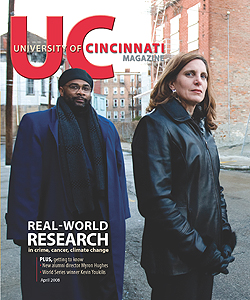Brain, hormones keys to fighting fat
by Amanda Hughes
As U.S. waistlines continue to grow, Americans search desperately for answers to lose weight -- diet books, dusty gym shoes, fad drugs and even hypnosis.
Turns out, the answer was in your head all along.
Researchers at the Obesity Research Center, part of UC's Genome Research Institute, are leading the way in discovering how hormones from the stomach talk to the brain, informing our organs how hungry we are, what nutrients we need and how much energy to store. The hormone pattern and signals sent from the stomach to the brain, called the gut-brain axis, create a "remote control" for metabolism.
Matthias Tschoep, one of several UC professors involved in the project, believes the findings can lead to better drug-treatment options to fight obesity by allowing researchers to manipulate the hormones and messages received by the brain.
Although research has focused mainly on a new hormone called ghrelin, Tschoep says many hormones communicate with the brain in a complex pattern of information exchange. The brain then directs the other organs accordingly, telling them how much fat to store, how to process sugar and whether to speed up or slow down metabolic rates.
"There are probably dozens of hormones and factors and signals coming at any given moment from our periphery -- our fat stores, our intestine, our pancreas, our liver, probably our muscles, to inform the brain of what is going on. I think that integrated pattern of all those signals at any given time is key to what the brain then does to our metabolism and hunger sensations."
Those hormonal patterns are hard-wired to help us survive, Tschoep says. Our ancestors were hunters and gatherers who didn't always know where their next meal was coming from or how long winter would be. So their bodies adapted, developing mechanisms to store as much energy and fat as possible to help them survive leaner times.
"Now, for about the last 100 years or so, this important system has turned against us. We have too much fat, too much food, too many easy ways to regulate our temperature," Tschoep says. "So our bodies just keep storing energy, and we all gain weight, and gain more weight, and so on."
Obesity is a serious health epidemic in the United States. According to the American Obesity Association, 127 million American adults are overweight; 60 million Americans are considered obese, and another 9 million are morbidly obese. Tschoep stresses that obesity leads to other serious health conditions, as well, particularly diabetes. For the first time, life expectancy for the current generation is lower than it was for the previous generation. Tschoep largely attributes this statistic to the rise in metabolic diseases.
Current drugs on the market, Tschoep says, target the fat stores in the human body, a method that usually comes with toxic side effects. "But if we can cheat the brain into thinking we are already full, the brain will do the job for us naturally, at an enhanced level, to do what we want it to do -- be less hungry, get rid of some of the fat."
Critics argue it's impossible to create a drug that will effectively block all the hormone signals between the brain and stomach because there are simply too many -- food intake is so vital to human survival that our bodies send every signal possible to make sure messages about how much we're eating are received by the brain.

 Issue Archive
Issue Archive